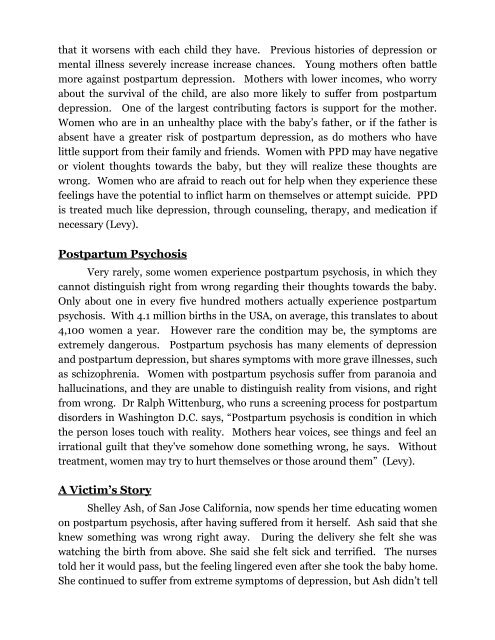The Skriker Actor Packet
The Skriker Actor Packet
The Skriker Actor Packet
You also want an ePaper? Increase the reach of your titles
YUMPU automatically turns print PDFs into web optimized ePapers that Google loves.
that it worsens with each child they have. Previous histories of depression or<br />
mental illness severely increase increase chances. Young mothers often battle<br />
more against postpartum depression. Mothers with lower incomes, who worry<br />
about the survival of the child, are also more likely to suffer from postpartum<br />
depression. One of the largest contributing factors is support for the mother.<br />
Women who are in an unhealthy place with the baby’s father, or if the father is<br />
absent have a greater risk of postpartum depression, as do mothers who have<br />
little support from their family and friends. Women with PPD may have negative<br />
or violent thoughts towards the baby, but they will realize these thoughts are<br />
wrong. Women who are afraid to reach out for help when they experience these<br />
feelings have the potential to inflict harm on themselves or attempt suicide. PPD<br />
is treated much like depression, through counseling, therapy, and medication if<br />
necessary (Levy).<br />
Postpartum Psychosis<br />
Very rarely, some women experience postpartum psychosis, in which they<br />
cannot distinguish right from wrong regarding their thoughts towards the baby.<br />
Only about one in every five hundred mothers actually experience postpartum<br />
psychosis. With 4.1 million births in the USA, on average, this translates to about<br />
4,100 women a year. However rare the condition may be, the symptoms are<br />
extremely dangerous. Postpartum psychosis has many elements of depression<br />
and postpartum depression, but shares symptoms with more grave illnesses, such<br />
as schizophrenia. Women with postpartum psychosis suffer from paranoia and<br />
hallucinations, and they are unable to distinguish reality from visions, and right<br />
from wrong. Dr Ralph Wittenburg, who runs a screening process for postpartum<br />
disorders in Washington D.C. says, “Postpartum psychosis is condition in which<br />
the person loses touch with reality. Mothers hear voices, see things and feel an<br />
irrational guilt that they've somehow done something wrong, he says. Without<br />
treatment, women may try to hurt themselves or those around them” (Levy).<br />
A Victim’s Story<br />
Shelley Ash, of San Jose California, now spends her time educating women<br />
on postpartum psychosis, after having suffered from it herself. Ash said that she<br />
knew something was wrong right away. During the delivery she felt she was<br />
watching the birth from above. She said she felt sick and terrified. <strong>The</strong> nurses<br />
told her it would pass, but the feeling lingered even after she took the baby home.<br />
She continued to suffer from extreme symptoms of depression, but Ash didn’t tell



